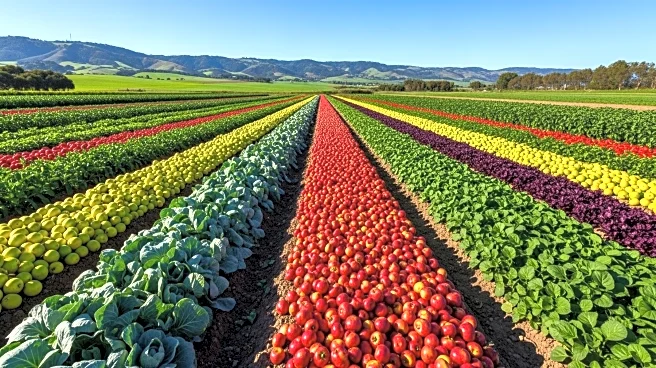What's Happening?
The organic farming market in the United States is anticipated to grow significantly, reaching $287.3 billion by 2032. This growth is driven by increasing consumer demand for chemical-free and environmentally friendly food products. Recent initiatives include Earthbound Farm's nationwide organic crop program and Amy's Kitchen's investment in regenerative agriculture. Mergers and acquisitions, such as Driscoll's acquisition of an organic berry farm, are strengthening supply chains and product quality. Partnerships, like Hain Celestial's collaboration with a startup, are focusing on sustainable crop solutions. These developments highlight the industry's focus on efficiency, soil health, and yield optimization.
Why It's Important?
The expansion of the organic farming market reflects a broader shift towards sustainable agriculture practices in the U.S. As consumers become more health-conscious and environmentally aware, the demand for organic produce is rising. This trend supports the growth of organic farming as a viable and profitable sector, offering opportunities for farmers and businesses to capitalize on premium pricing for organic products. The market's growth also aligns with government incentives and certification programs promoting sustainable agriculture, potentially influencing public policy and industry standards. The focus on clean, traceable, and high-quality food positions organic farming as a critical component of modern agriculture.
What's Next?
The organic farming market is expected to continue its upward trajectory, driven by technological advancements and innovative farming practices. Techniques such as integrated pest management and crop rotation are enhancing farm productivity without synthetic inputs. The expansion of organic food retail and e-commerce platforms will facilitate market growth, providing consumers with greater access to organic products. As the market evolves, stakeholders may see increased collaboration between companies and startups to develop sustainable solutions. The industry's growth could lead to further investments in research and development, supporting the adoption of climate-smart farming techniques.
Beyond the Headlines
The growth of the organic farming market may have deeper implications for environmental sustainability and food security. By promoting biodiversity and sustainable water use, organic farming practices contribute to the resilience of agricultural systems. The industry's expansion could also influence cultural attitudes towards food production, encouraging a shift towards more sustainable consumption patterns. Additionally, the focus on organic farming may drive innovation in agricultural technology, leading to new methods for enhancing soil health and crop yields. These developments could have long-term impacts on global food systems and environmental conservation efforts.









